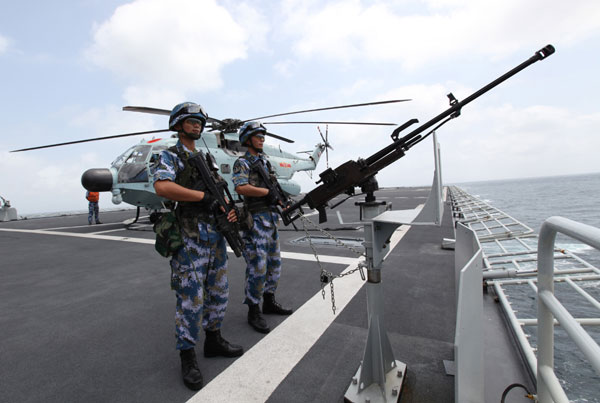 |
|
Chinese Navy soldiers observe from China's amphibious landing ship Changbaishan during an escort mission in the Gulf of Aden, Aug 26, 2014. [Photo/Xinhua] |
China would not have thought of establishing a logistic supply station in Djibouti were it not for fighting piracy off the coast of Somalia. As the country contributing the largest force to the counter-piracy mission, China has had at least three ships in the Gulf of Aden at any given time since 2009. So far 65 ships from the People's Liberation Army Navy's 22 task forces have been deployed on counter-piracy missions, and they have escorted more than 6,100 ships, half of them foreign vessels.
These achievements have been made under stringent conditions, however. Since the PLA Navy vessels have no supply or maintenance stations overseas, they have to carry huge amounts of food and spare parts, prompting some Chinese Navy personnel to say the spare parts are more than enough to assemble a helicopter on board.
Piracy off the coast of Somalia has been largely curbed thanks to joint international efforts which includes, but is not limited to, military operations. But nobody can safely conclude piracy is no longer a threat.
The piracy threat at sea has its roots on land. Although a federal government is now in place in the Somali capital of Mogadishu, its control over the country remains miserably weak. A Western analyst has said, almost sarcastically, that the Somali government's control is restricted only to the airport and the presidential palace. And the United Nation has repeatedly warned piracy could stage a comeback if the political situation in Somalia remains unstable and the problem of high unemployment unsolved.
Therefore, the counter-piracy mission is likely to continue, though under a more flexible arrangement. The North Atlantic Treaty Organization and the European Union have even publicly discussed discontinuing their counter-piracy missions by the end of 2016 but promised to maintain some kind of presence off the coast of Somalia if necessary. Every year about 1,600 Chinese vessels pass through the Gulf of Aden, and more ships carrying oil for China are likely to sail to through the Strait of Hormuz. The security of sea lanes cannot be more critical for China, which relies on maritime transport for up to 90 percent of its foreign trade.

I’ve lived in China for quite a considerable time including my graduate school years, travelled and worked in a few cities and still choose my destination taking into consideration the density of smog or PM2.5 particulate matter in the region.